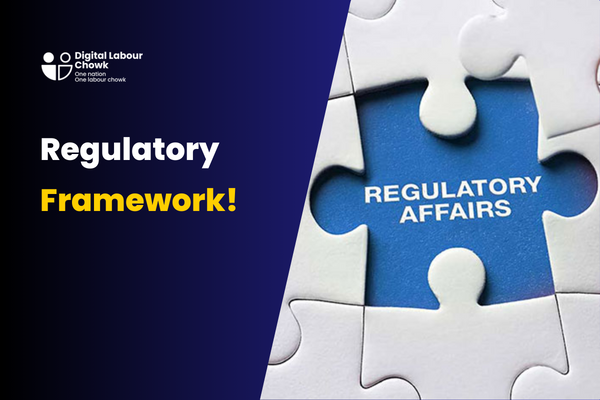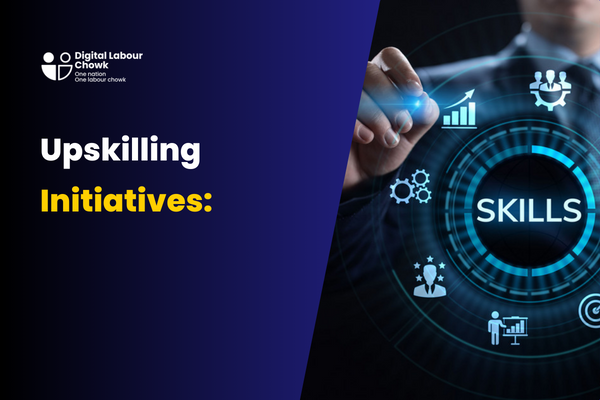Physical Address
Introduction: The Significance of Blue-Collar Jobs in India

Blue collar jobs form the bedrock of India’s economy, playing a pivotal role in driving industrial growth, infrastructure development, and the provision of essential services. From construction workers erecting towering skyscrapers to electricians ensuring the smooth operation of infrastructure, plumbers facilitating water supply, and factory workers manufacturing goods, blue-collar workers are the unsung heroes who keep the nation running.
Despite their indispensable contribution, blue-collar workers in India face numerous challenges that hinder their growth and recognition. These challenges include skill gaps, informalization of work, gender disparity, social stigma, and inadequate working conditions.
Acknowledging the significance of blue-collar employment is crucial not only for economic prosperity but also for social equity. By addressing the barriers that impede the growth of blue-collar jobs and enhancing opportunities
for blue-collar workers, India can unlock its full potential for inclusive growth and development. This blog explores the current state of blue-collar employment in India, highlights the challenges faced by blue-collar workers, and presents strategies to overcome these barriers. By fostering a supportive ecosystem that values and invests in the well-being and advancement of blue-collar workers, India can build a brighter future for all.
If you want to know about challenges of blue colar workers then visit: https://www.linkedin.com/pulse/employment-challenges-blue-grey-collar-workers-india-rachna-gaur
Current Challenges in Blue Collar Employment

Skill Gap and Mismatch
One of the foremost challenges in blue collar employment in India is the persistent gap between the skills demanded by employers and those possessed by the workforce. This mismatch leads to widespread unemployment and underemployment among blue-collar workers, hindering their ability to secure stable and fulfilling employment opportunities.
Informalization and Precarious Work
A significant portion of the blue collar workforce in India operates within the informal sector, where workers lack job security, social protections, and proper workplace regulations. This informalization of work exacerbates vulnerabilities and perpetuates a cycle of precarious employment conditions.
Gender Disparity
Women in India continue to face significant barriers to entry and advancement in blue-collar occupations due to societal norms, limited access to training opportunities, and unsafe working environments. Gender disparities persist, restricting women’s participation and contribution to the blue collar workforce.
Social Stigma and Lack of Recognition
Blue collar jobs in India often suffer from a perceived lack of prestige and recognition compared to white-collar professions. This social stigma discourages individuals from pursuing careers in blue-collar fields, despite the essential role these occupations play in driving economic growth and development.
Uncertain Work Conditions and Low Wages
Many blue collar workers in India grapple with uncertain working conditions, including long hours, unsafe environments, and inadequate wages. These challenges undermine workers’ well-being and contribute to widespread dissatisfaction and economic insecurity within the blue collar workforce.
Strategies for Enhancing Opportunities
By implementing the following strategies, we can pave the way for a more promising future for blue collar employment in India:
Skill Development and Training Initiatives
To address the skill gap in blue collar employment, robust skill development and training initiatives are essential. By investing in tailored programs that equip workers with both technical expertise and soft skills, we can enhance their employability and bridge the gap between industry demand and workforce capabilities.
Formalization of the Workforce
Promoting the formalization of the informal sector is crucial for providing blue collar workers with job security, social protections, and adherence to labor regulations. By incentivizing registration and regulation, we can create a more stable and equitable environment for blue collar workers to thrive.
Promoting Gender Equality in Blue-Collar Jobs
Efforts to promote gender equality in blue-collar occupations are imperative to ensure equal access and opportunities for all. By raising awareness, providing targeted training programs, and creating safe and inclusive work environments, we can empower women to participate fully in the blue-collar workforce.
Improving Working Conditions and Social Security
Enhancing working conditions and providing social security benefits are fundamental for safeguarding the well-being of blue collar workers. Implementing stricter regulations, ensuring access to basic health insurance, and enforcing minimum wage standards can significantly improve the quality of life for workers in these sectors.
Technological Integration and Upskilling
Embracing technological advancements and offering upskilling programs are essential for blue collar workers to remain competitive in the evolving job market. By providing opportunities for workers to acquire new skills and adapt to technological changes, we can ensure their continued relevance and productivity in the workforce.
Role of Government, Industry, and Individuals

Efforts to enhance opportunities for blue collar employment require collaboration and action from various stakeholders. Governments, industries, and individuals each have unique roles to play in fostering a conducive environment for the growth and recognition of blue collar jobs in India.
Government
Governments play a pivotal role in shaping policies and regulations that support blue collar workers. By formulating and implementing policies that incentivize skill development, promote formalization, ensure worker safety, and enforce labor standards, governments can create an enabling environment for blue-collar employment to thrive.
Industry
Industries hold the key to bridging the skill gap and providing meaningful employment opportunities for blue collar workers. By collaborating with educational institutions, offering on-the-job training programs, and investing in skill development initiatives, industries can ensure that their workforce is equipped with the necessary skills and expertise to meet industry demands.
Individuals
Individuals also have a role to play in enhancing opportunities for blue collar employment. By actively seeking out skill development opportunities, advocating for better working conditions, and embracing lifelong learning, individuals can improve their employability and contribute to their own personal and professional growth. Additionally, individuals can support initiatives that promote gender equality and social inclusion in the blue-collar workforce, creating a more equitable and diverse labor market.
The Rise of the Gig Economy

In recent years, the gig economy has emerged as a significant force reshaping the traditional employment landscape in India. Characterized by short-term contracts, freelance work, and on-demand services, the gig economy offers individuals flexibility and autonomy in their work arrangements. Platforms like Uber, Swiggy, and Urban Company have transformed how services are delivered, creating new opportunities for both workers and consumers.
The gig economy presents numerous benefits, including flexible working hours, increased earning potential, and the ability to leverage individual skills and talents. It has also democratized access to employment opportunities, allowing individuals from diverse backgrounds to participate in the workforce on their own terms.
However, the gig economy also poses challenges, including job insecurity, lack of social protections, and regulatory concerns. As the gig economy continues to expand, policymakers, businesses, and workers alike must address these challenges to ensure fair and equitable outcomes for all involved parties.
Opportunities:
Flexibility
The gig economy offers workers the freedom to choose their own schedules, allowing for better work-life balance and the ability to pursue other interests or commitments outside of traditional working hours
Income Potential
Gig workers have the opportunity to earn more than traditional employees, especially during peak demand periods or by leveraging their skills in multiple platforms simultaneously.
Skill Enhancement
Working in the gig economy often requires individuals to develop entrepreneurial skills such as marketing, customer service, and financial management, which can enhance their employability and open doors to other opportunities.
Challenges
Job Insecurity
Blue Collar workers often face uncertainty regarding their employment status, with no guarantees of ongoing work or income. This lack of job security can lead to anxiety and financial instability, especially during periods of low demand or when facing unexpected changes in the market.
Income Stability
Earnings in the gig economy can be unpredictable, fluctuating based on factors such as demand, competition, and seasonality. This instability makes it challenging for Blue collar workers to plan their finances, access credit, or meet their long-term financial goals.
Lack of Regulation
The gig economy operates in a regulatory gray area, with limited protections for workers regarding wages, working conditions, and dispute resolution. This lack of regulation can leave Blue Collar workers vulnerable to exploitation, unfair treatment, and arbitrary decisions by platform companies.
Regulatory Framework

To address the challenges posed by the gig economy and ensure fair treatment for blue collar workers, there is a need for robust regulatory frameworks that balance flexibility with worker rights. Key considerations include:
Classification of Workers
Clear guidelines for classifying workers as employees or independent contractors to determine their entitlements to benefits and protections.
Minimum Standards
Establishing minimum wage standards, working hours, and safety regulations applicable to blue collar workers to ensure decent working conditions and fair compensation.
Social Security
Exploring innovative solutions for providing social security benefits such as health insurance, retirement savings, and unemployment benefits to gig workers, ensuring their financial stability and well-being.
Dispute Resolution Mechanisms
Implementing efficient mechanisms for resolving disputes between blue collar workers and platform companies, including avenues for collective bargaining and representation.
Promoting Entrepreneurship
Entrepreneurship presents a promising avenue for skilled blue collar workers to create their own opportunities and contribute to economic growth. By starting their own businesses, individuals can leverage their expertise, creativity, and passion to meet market demands and generate employment opportunities for others.
Support Ecosystem:
Access to Finance
Facilitating access to affordable credit and financial services for blue collar workers through government schemes, microfinance institutions, and banks, enabling them to invest in their businesses and achieve financial stability.
Training and Mentoring
Providing comprehensive training programs and mentorship opportunities to equip blue collar workers with the knowledge, skills, and guidance needed to succeed in their chosen fields and navigate the challenges of entrepreneurship.
Incubation Centers
Establishing incubation centers and startup hubs that offer infrastructure, resources, and networking opportunities for gig workers to develop and grow their businesses, fostering innovation and collaboration within the ecosystem.
Market Linkages
Facilitating connections and collaborations between gig workers and potential clients, businesses, or partners to help them access new markets, expand their customer base, and generate sustainable income streams.
Success Stories:
One inspiring success story in the gig economy is that of Ramesh, a former construction worker turned freelance electrician. Armed with basic electrical skills acquired through informal apprenticeships, Ramesh ventured into the gig economy by offering his services on online platforms. Through perseverance and dedication, he gradually built a reputation for his reliability, quality workmanship, and customer service. As demand for his services grew, Ramesh expanded his business, hiring and training other aspiring electricians from his community. Today, he runs a thriving electrical services company, serving both residential and commercial clients across the city. Ramesh’s journey exemplifies the transformative power of the gig economy in empowering individuals to overcome barriers, achieve financial independence, and build successful businesses from the ground up. His story serves as inspiration for other gig workers seeking to carve their own path to success in the dynamic world of freelance work.
Building a Culture of Lifelong Learning

Embracing a culture of lifelong learning is essential for blue-collar workers to remain competitive and adaptable in today’s rapidly evolving job market. By encouraging continuous skill development, upskilling, and reskilling, individuals can enhance their employability, adapt to technological advancements, and seize new opportunities for personal and professional growth. Employers, educational institutions, and government agencies play a crucial role in providing accessible and relevant learning opportunities, fostering a culture where learning is valued, celebrated, and integrated into the fabric of daily life. Through lifelong learning, blue-collar workers can stay ahead of the curve, navigate industry changes, and chart a path towards long-term success and fulfillment in their careers.
Upskilling Initiatives:

Technical Training Programs
Offering specialized technical training programs and certification courses tailored to the needs of blue-collar workers, equipping them with the latest industry-specific skills and knowledge required to excel in their roles.
Soft Skills Development
Providing workshops and seminars focused on developing essential soft skills such as communication, teamwork, problem-solving, and adaptability, enhancing workers’ ability to collaborate effectively and navigate diverse work environments.
Online Learning Platforms
Leveraging digital technology to provide convenient and accessible learning opportunities through online platforms, enabling blue-collar workers to access educational resources, tutorials, and interactive modules from anywhere, at any time.
On-the-Job Training
Offering practical on-the-job training and mentorship programs that allow workers to gain hands-on experience, refine their skills, and learn from experienced professionals in their respective fields, facilitating continuous learning and professional development.
Government Support:

Subsidized Training Programs
The government can provide financial assistance and subsidies to support skill development initiatives and training programs for blue-collar workers, making education and vocational training more accessible and affordable.
Recognition of Prior Learning
Implementing policies to recognize and accredit the skills and experience acquired through informal or non-traditional learning pathways, enabling blue-collar workers to formalize their qualifications and access further education or employment opportunities.
Career Counseling Services
Establishing career counseling centers and services to provide guidance, information, and support to individuals seeking to explore blue-collar career paths, helping them make informed decisions about their education, training, and employment options.
FAQs
What are the benefits of pursuing a blue-collar career?
Blue-collar jobs offer a wide range of benefits, including job security, opportunities for career advancement, competitive salaries in skilled trades, and the satisfaction of contributing to tangible results.
How can I find information about blue-collar training programs?
Several government agencies and private institutions offer skill development programs for blue-collar jobs. Research online resources, consult with vocational training centers, or inquire directly with relevant
What are some ways to promote gender equality in blue-collar jobs?
Promoting gender equality in blue-collar jobs involves creating awareness campaigns, providing targeted training programs, ensuring safe and inclusive work environments, and challenging stereotypes and biases that discourage women from pursuing careers in traditionally male-dominated fields.
How can blue-collar workers access subsidized training programs offered by the government?
Blue-collar workers can typically access subsidized training programs through government agencies, vocational training centers, or relevant industry associations. These programs may require individuals to meet certain eligibility criteria and undergo an application process.
What is the process for obtaining recognition of prior learning for blue-collar workers?
The process for obtaining recognition of prior learning varies depending on the specific policies and procedures implemented by government authorities. Generally, individuals can apply for recognition by providing evidence of their skills and experience through assessments or portfolio submissions.
Are career counseling services available for individuals interested in pursuing blue-collar careers?
Yes, many government agencies, educational institutions, and vocational training centers offer career counseling services for individuals interested in exploring blue-collar career paths. These services typically provide guidance on education and training options, job opportunities, and skill development pathways.
How can blue-collar workers access online learning platforms for upskilling and reskilling?
Blue-collar workers can access online learning platforms by registering for courses or programs offered by reputable providers. These platforms may offer a wide range of courses, tutorials, and resources covering technical skills, soft skills, and industry-specific knowledge.
Are there any financial assistance programs available for blue-collar workers pursuing technical training programs?
Yes, some government agencies and organizations offer financial assistance programs, scholarships, or grants to support blue-collar workers in pursuing technical training programs. Eligibility criteria, application procedures, and deadlines may vary depending on the specific program.
How can employers and organizations contribute to promoting lifelong learning among blue-collar workers?
Employers and organizations can promote lifelong learning among blue-collar workers by offering on-the-job training opportunities, investing in skill development programs, providing access to educational resources, and creating a supportive work environment that values continuous learning and professional growth.
Conclusion
In conclusion, enhancing opportunities for blue-collar employment in India requires concerted efforts from various stakeholders – governments, industries, educational institutions, and individuals. Despite the challenges faced by blue-collar workers, including skill gaps, informalization of work, gender disparities, and inadequate working conditions, there is immense potential for positive change and progress.
By implementing strategies such as skill development and training initiatives, promoting formalization of the workforce, fostering gender equality, improving working conditions and social security, and embracing technological integration and upskilling, we can create a more inclusive and empowering environment for blue-collar workers.
Furthermore, the rise of the gig economy presents both opportunities and challenges for blue-collar workers, necessitating a balance between flexibility and worker rights through effective regulatory frameworks.
Success stories of individuals who have thrived in the gig economy or through entrepreneurship serve as inspiration and demonstrate the transformative impact of creating a supportive ecosystem for blue-collar employment.
In building a culture of lifelong learning, we ensure that blue-collar workers remain competitive and adaptable in a rapidly evolving job market, unlocking their full potential for personal and professional growth.
Ultimately, by breaking down barriers, fostering collaboration, and promoting dignity and respect for blue-collar jobs, we can build a brighter future where every worker is valued, empowered, and able to contribute meaningfully to India’s economic and social development.

